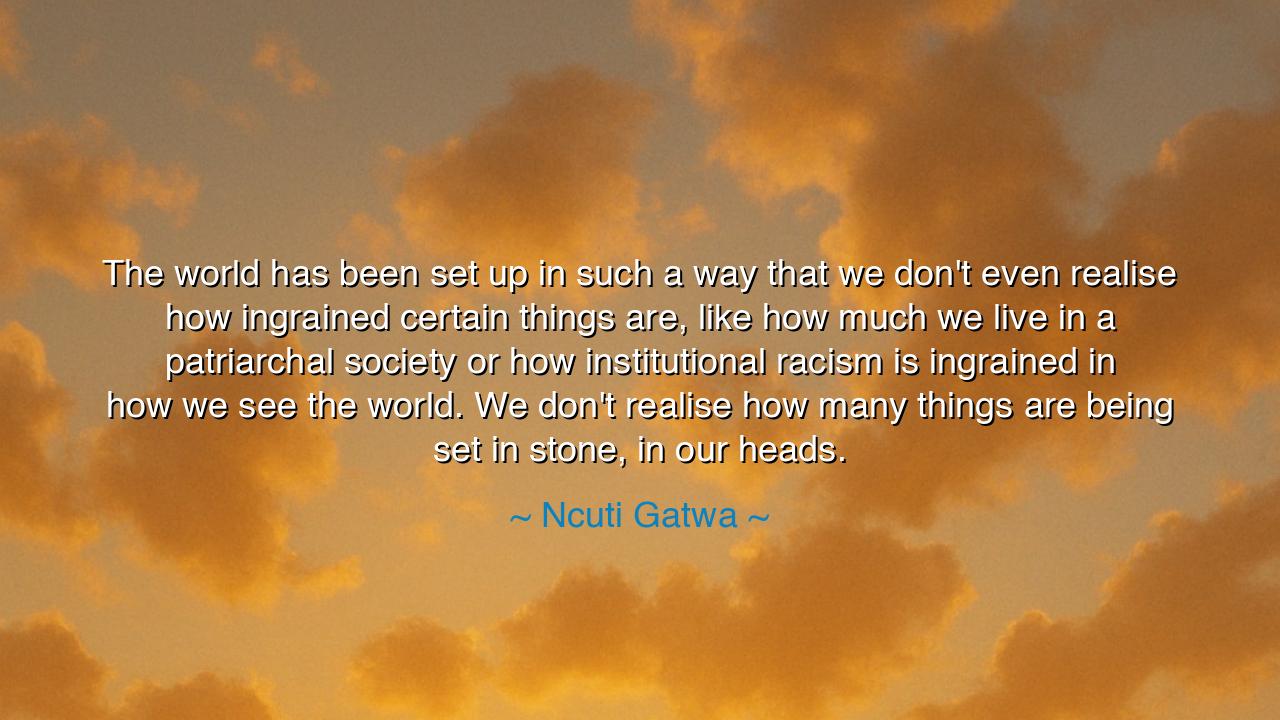
The world has been set up in such a way that we don't even
The world has been set up in such a way that we don't even realise how ingrained certain things are, like how much we live in a patriarchal society or how institutional racism is ingrained in how we see the world. We don't realise how many things are being set in stone, in our heads.






The actor and truth-teller Ncuti Gatwa once spoke with piercing honesty: “The world has been set up in such a way that we don't even realise how ingrained certain things are, like how much we live in a patriarchal society or how institutional racism is ingrained in how we see the world. We don't realise how many things are being set in stone, in our heads.” These words are not casual musings, but a cry to awaken from slumber, to see the invisible chains that bind us, not in flesh but in thought. For the deepest prisons are not built of stone, but of ideas so ingrained that they are mistaken for nature itself.
To say that we live in a patriarchal society and under the weight of institutional racism is to remind us that injustice is not only in actions, but in systems, in customs, in the very air we breathe. Children are born into patterns already woven long before them; their minds shaped by stories, by images, by laws and traditions that whisper what is “normal” and what is not. Thus, many walk through life unaware that their very thoughts have been molded by forces designed to preserve power for some and deny it to others. Gatwa’s words uncover this hidden realm of oppression—reminding us that even when the walls are unseen, they are no less real.
History has shown again and again how people live without realizing how deeply such things are written into their minds. Consider the story of South Africa under apartheid. For decades, laws divided men and women by the color of their skin, and yet even beyond the laws, people’s very thoughts were taught to conform. Generations were raised to believe separation was natural, that oppression was order. It took voices crying out, protests swelling, and sacrifices immense to reveal that what seemed “set in stone” was only set in the minds of men. Once the illusion cracked, the stone gave way.
Or think of the long struggle for women’s rights. For centuries, women were told their place was only in the home, denied education, denied the vote, denied the freedom to shape the world beyond the domestic sphere. This was not written by nature—it was set in stone by patriarchal custom, repeated until it seemed unquestionable. But when women rose, when they claimed their voices in marches, in classrooms, in parliaments, the world discovered that what had seemed unshakable was only a lie disguised as destiny.
The meaning of Gatwa’s words, then, is both sobering and liberating: sobering, because it reveals how easily we accept chains we cannot see; liberating, because to see them is the first step to breaking them. The world is set up to make us blind to its injustices, but awareness is a hammer that can shatter the stones in our heads. When we learn to question the “natural,” when we learn to look at our assumptions with clear eyes, we begin the sacred work of remaking society into something more just.
The lesson for us is clear: we must not take the world as it is for the world as it must be. Question what has been handed down to you. Examine the patterns in your own mind. Ask: who benefits from this belief? Who suffers? What truths have I been taught that are, in fact, falsehoods disguised as wisdom? Only by such questioning can we loosen the stones that have been set in our thoughts and open space for freedom, justice, and compassion.
Practical wisdom flows: seek voices unlike your own, listen to the oppressed, and study the histories that have been hidden. Resist the comfort of assuming that what is, must always be. Teach your children not only facts, but the courage to question the patterns that shape them. And in your own life, stand as one who refuses to let injustice remain invisible—name it, confront it, break it. For the chains of the mind are broken only when men and women choose to see them and strike against them.
So let Gatwa’s words echo within you: “We don’t realise how many things are being set in stone, in our heads.” Let them remind you that thought itself can be colonized, that society writes on the tablets of the mind. But also let them call you to courage, for every stone can be broken, and every mind made free. And when minds are free, societies can be remade—not in the image of power, but in the image of justice.






AAdministratorAdministrator
Welcome, honored guests. Please leave a comment, we will respond soon